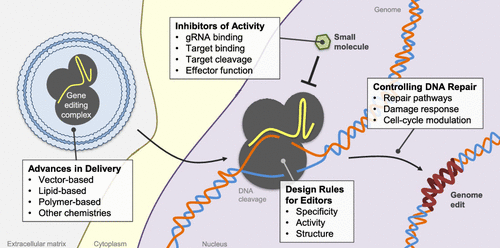当前位置:
X-MOL 学术
›
ACS Chem. Biol.
›
论文详情
Our official English website, www.x-mol.net, welcomes your feedback! (Note: you will need to create a separate account there.)
Genome Editing: Insights from Chemical Biology to Support Safe and Transformative Therapeutic Applications
ACS Chemical Biology ( IF 4 ) Pub Date : 2017-10-18 00:00:00 , DOI: 10.1021/acschembio.7b00689 Renee D. Wegrzyn 1 , Andrew H. Lee 2 , Amy L. Jenkins 3 , Colby D. Stoddard 4 , Anne E. Cheever 2
ACS Chemical Biology ( IF 4 ) Pub Date : 2017-10-18 00:00:00 , DOI: 10.1021/acschembio.7b00689 Renee D. Wegrzyn 1 , Andrew H. Lee 2 , Amy L. Jenkins 3 , Colby D. Stoddard 4 , Anne E. Cheever 2
Affiliation

|
Programmable nuclease-based genome editing technologies, including the clustered, regularly interspaced, short palindromic repeats (CRISPR)/Cas9 system, are becoming an essential component of many applications ranging from agriculture to medicine. However, fundamental limitations currently prevent the widespread, safe, and practical use of genome editors, especially for human disease interventions. These limitations include off-target effects, a lack of control over editing activity, suboptimal DNA repair outcomes, insufficient target conversion, and inadequate delivery performance. This perspective focuses on the potential for biological chemistry to address these limitations such that newly developed genome editing technologies can enable the broadest range of potential future applications. Equally important will be the development of these powerful technologies within a relevant ethical framework that emphasizes safety and responsible innovation.
中文翻译:

基因组编辑:来自化学生物学的见解,可支持安全和转化治疗应用
基于可编程核酸酶的基因组编辑技术,包括成簇的,规则间隔的,短回文重复序列(CRISPR)/ Cas9系统,正成为从农业到医学的许多应用程序中必不可少的组成部分。但是,当前的基本限制阻止了基因组编辑器的广泛,安全和实际使用,尤其是在人类疾病干预方面。这些局限性包括脱靶效应,对编辑活性的控制不足,DNA修复效果欠佳,靶标转化不足以及传递性能不足。该观点侧重于生物化学解决这些局限性的潜力,以便新开发的基因组编辑技术可以实现最广泛的潜在未来应用。
更新日期:2017-10-18
中文翻译:

基因组编辑:来自化学生物学的见解,可支持安全和转化治疗应用
基于可编程核酸酶的基因组编辑技术,包括成簇的,规则间隔的,短回文重复序列(CRISPR)/ Cas9系统,正成为从农业到医学的许多应用程序中必不可少的组成部分。但是,当前的基本限制阻止了基因组编辑器的广泛,安全和实际使用,尤其是在人类疾病干预方面。这些局限性包括脱靶效应,对编辑活性的控制不足,DNA修复效果欠佳,靶标转化不足以及传递性能不足。该观点侧重于生物化学解决这些局限性的潜力,以便新开发的基因组编辑技术可以实现最广泛的潜在未来应用。



























 京公网安备 11010802027423号
京公网安备 11010802027423号